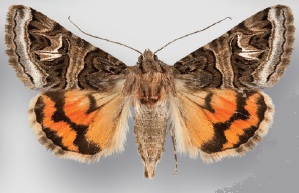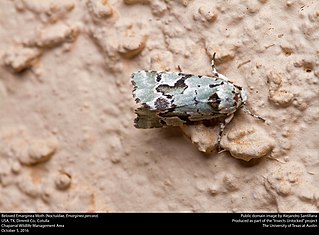
The Noctuidae, commonly known as owlet moths, cutworms or armyworms, are a family of moths. They are considered the most controversial family in the superfamily Noctuoidea because many of the clades are constantly changing, along with the other families of the Noctuoidea. It was considered the largest family in Lepidoptera for a long time, but after regrouping Lymantriinae, Catocalinae and Calpinae within the family Erebidae, the latter holds this title now. Currently, Noctuidae is the second largest family in Noctuoidea, with about 1,089 genera and 11,772 species. This classification is still contingent, as more changes continue to appear between Noctuidae and Erebidae.

Noctuoidea is the superfamily of noctuid or "owlet" moths, and has more than 70,000 described species, the largest number of for any Lepidopteran superfamily. Its classification has not yet reached a satisfactory or stable state. Since the end of the 20th century, increasing availability of molecular phylogenetic data for this hugely successful radiation has led to several competing proposals for a taxonomic arrangement that correctly represents the relationships between the major lineages.

Xestia is a genus of noctuid moths. They are the type genus of the tribe Xestiini in subfamily Noctuinae, though some authors merge this tribe with the Noctuini. Species in this genus are commonly known as "clays", "darts" or "rustics", but such names are commonplace among Noctuidae. Xestia moths have a wide distribution, though they most prominently occur in the Holarctic.

Apamea is a genus of moths in the family Noctuidae first described by Ferdinand Ochsenheimer in 1816.

Agrotis is a genus of moths of the family Noctuidae. The genus was erected by Ferdinand Ochsenheimer in 1816. A number of the species of this genus are extinct.

The Calpinae are a subfamily of moths in the family Erebidae described by Jean Baptiste Boisduval in 1840. This subfamily includes many species of moths that have a pointed and barbed proboscis adapted to piercing the skins of fruit to feed on juice, and in the case of the several Calyptra species of vampire moths, to piercing the skins of mammals to feed on blood. The subfamily contains some large moths with wingspans longer than 5 cm (2 in).

Acontiinae is a subfamily of bird dropping moths in the family Noctuidae. There are more than 50 genera and 430 described species in Acontiinae, found worldwide in temperate and tropical climates.

Amphipyrinae is a subfamily of owlet moths in the family Noctuidae. There are more than 50 genera and 210 described species in Amphipyrinae, although the classifications are likely to change over time.

Hadenini is a tribe of cutworm or dart moths in the family Noctuidae. There are more than 140 genera and 1,000 described species in Hadenini, found worldwide.

The Apameini are a mid-sized tribe of moths in the Noctuinae subfamily.

Abagrotis is a genus of moths of the family Noctuidae.

Drasteria is a genus of moths in the family Erebidae.

Euxoa is a genus of moths of the family Noctuidae raised to Genus by the German entomologist, Jacob Hübner. The Genus is mostly confined to dry and semi dry areas in the Northern Hemisphere. There 130 species in Eurasia, a few in Africa, and 175 in North America. There are no species in the Genus in South-East Asia or in Australia. In North America, most species are found in Western regions. Of the North American species, 4 are endemic to Mexico. There is one species recorded from Chile, but this may be a mislabeled specimen. In real terms, species numbers do not equal species abundance. Some areas with few species have large numbers of the ones that do live there.

Lithophane is a genus of moths of the family Noctuidae. They spend the winter as adults. Some species are capable of feeding on other caterpillars or on sawfly larvae, which is rather uncommon among Lepidoptera.

Tarache is a genus of moths of the family Noctuidae erected by Jacob Hübner. It includes most former New World Acontia species. Lepidoptera and Some Other Life Forms and The Global Lepidoptera Names Index report this name as a synonym of Acontia.

Heliothinae is a small, cosmopolitan subfamily of moths in the family Noctuidae, with about 400 described species worldwide. It includes a number of economically significant agricultural pest species, such as Helicoverpa armigera and Helicoverpa zea.

Noctuina is a subtribe of cutworm or dart moths in the family Noctuidae. There are at least 170 described species in Noctuina.

Psaphidini is a tribe of owlet moths in the family Noctuidae. There are at least 40 genera and at least 90 described species in Psaphidini.

Metoponiinae is a subfamily of owlet moths in the family Noctuidae. There are about 16 genera and more than 70 described species in Metoponiinae.


















